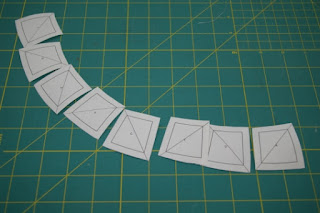My Great Grandfather, John, was born on May 16, 1842 in Jennings County, Indiana, his parents' only son. Twenty years later, on August 7, he joined up with the newly formed 82nd Indiana Regiment. This regiment served in what became the Army of the Cumberland and participated in the battles of Stones River, Chickamauga, Chattanooga, Atlanta, the March to the Sea and some of the last fighting in North Carolina in early 1865.
Barbara Brackman has started a Civil War block series for 2013 using the diary of Sarah Morgan and a 19th Century sampler to recall events of this time 150 years ago. I am making the blocks for a quilt and will follow the 82nd Indiana Regiment's 1863 history as we go. Two of my grandmother Faye's great uncles, my great great uncles William and Shepherd, also fought for the Union. William was with John in the 82nd, and Shepherd served with the Indiana 52nd. We have first-hand testimony of what both Shepherd and William experienced in letters written to other family members that were preserved and used for the book
From the Hayfields to the Battlefields, copyright 1986 by Rodger D. Ruddick (now out of print.) I am also referring to the regimental history written by Alfred Hunter, brother of the 82nd's commander, Colonel Morton C. Hunter, who served as adjutant.
The first block is Her Flag Flying, which recalls Sarah's story of defiantly wearing the Confederate Flag pinned to her shoulder after Union forces occupied her native city of New Orleans. I am using fabrics I used in Roger and Laurie's 2011 Civil War Block of the Month,
Flowers for John Herman, so my block is not so markedly patriotic.
This Block of the Month is designed to be more accessible to quilters of varying skill levels. To make the construction a little more challenging for me, I'm making my blocks only 6 inches instead of 8 or 12.
By December 1862, the 82nd had been near Nashville for five weeks. Mid-month they started moving to Murfreesboro, first by rail, then on the march. While on the road, still in December, they had a close encounter with a small Rebel force already engaged with other units, but the 82nd only had to fix bayonets to convince them to move away. During the regiment's part in the battle of Stones River, January 1st-3rd, 1863, William wrote later, they were in the front line behind breastworks, but were never actually engaged, though their brigade's battery was very busy firing. On the 4th, they spent the day burying the dead and caring for the wounded from both armies. They then set up camp just east of Murfreesboro and remained there for the next three months. William wrote of coming through the battlefield where the last charge was made, "You had better believe it was a hard looking sight, men
lying in the mud, torn to pieces by musket and cannon ball. I don't see how civilized people can perform in such a way but I see they do..."
















